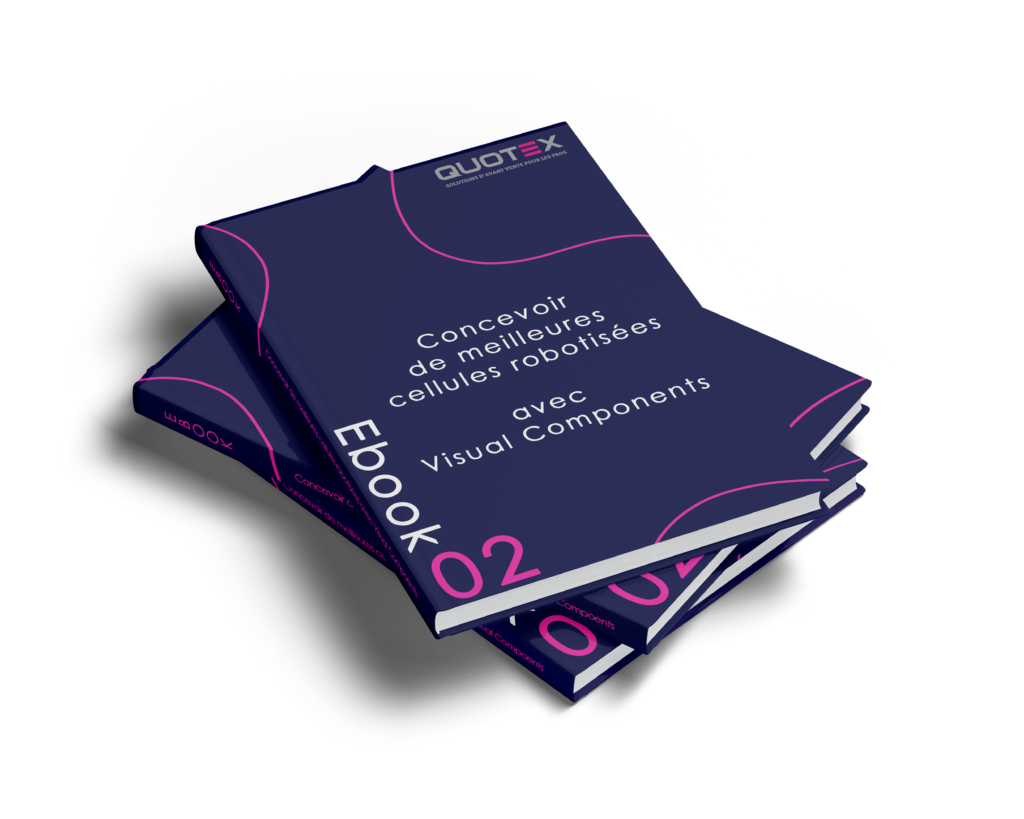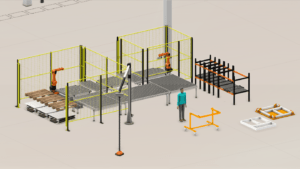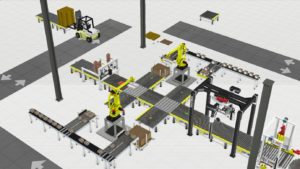Dans cette étude de cas, nous allons voir comment FSK Engineering Gmbh, fournisseur de solutions de programmation de robot décrit la simulation 3D de robots comme entièrement fonctionnelle. Celle-ci, permet de simplifier et de donner vie au dessin CAO bidimensionnel grâce au logiciel de simulation, Visual Components.
Utilisation de la simulation 3D de robots en ingénierie
FSK Engineering GmbH fournit des solutions de programmation de robot en ligne et hors ligne, des simulations de robot et des systèmes automatisés jusqu’à une usine entièrement numérique. Leurs principaux clients sont dans l’industrie automobile mais ils servent également des clients dans les secteurs de l’agriculture et de l’agroalimentaire.
FSK Engineering utilise le logiciel de simulation 3D de robots, Visual Components pour concevoir et réaliser des plans d’usine. Nous laissons donc Christian Sühwold et Nils Kühle, les fondateurs de FSK Engineering, nous dire comment le logiciel les a aidés à gérer leur entreprise.
« La simulation est notre porte d'entrée lors de la rencontre de nouveaux clients et prospects. Avec la simulation 3D de robots, il est facile de visuliser nos visions complexes de lignes de production ou d'atelier de production complets pour les clients. Grâce à des simulations 3D, nous concluons l'accord et obtenons une commande pour la mise en service et la livraison du robot presque à chaque fois. »
Christian Sühwold, PDG et co-fondateur de FSK Engineering Gmbh
La simulation robotique donne vie au dessin CAO bidimensionnel
Par rapport à l’utilisation de fichiers CAO, la simulation 3D de Visual Components permet de gagner beaucoup de temps, en particulier lorsque vous travaillez directement avec les concepteurs. La CAO seule est statique et il est donc souvent difficile de visualiser la réalité de la ligne de production réelle ou le fonctionnement des robots.

La simulation a joué un rôle essentiel dans la phase de soumission et de mise en œuvre d’une cellule robotisée mise en œuvre chez Strothmann Machines & Handling GmbH. Une simulation a été créée prenant en compte toutes les contraintes de construction et d’accessibilité. (à gauche : cellule de robot réelle; à droite : cellule simulée)
Le logiciel de simulation de robot, Visual Components facilite grandement cette tâche. Une simulation 3D entièrement fonctionnelle simplifie donne vie à la CAO 2D. Le temps est gagné car les modèles CAO prêts à environ 80% peuvent être importés dans le logiciel de simulation et analysés en profondeur.
Les informations CAO manquent à elles seules d’informations détaillées sur la façon dont les robots doivent être positionnés et comment ils doivent fonctionner. Comprendre les réalités de l’usine est donc difficile pour les concepteurs utilisant uniquement des fichiers CAO.
« Assemblage de câbles, chemin de câbles, piliers de hall... Tout cela peut être vu sous différents angles. Cela permet de comprendre facilement comment tout fonctionne. »
Nils Kühle, PDG et co-fondateur de FSK Engineering Gmbh
Le logiciel de simulation robotique : Simple à adopter, facile à utiliser
Pour l’ingénierie FSK, commencer à utiliser la simulation 3D de robots avec Visual Components était une étape simple. Après une simple formation de trois jours, ils ont pu créer des implantations présentables, visualiser les mouvements du robot, combiner des composants et analyser eux-mêmes les cycles du robot.
« En particulier lors de l'exécution de robots, il est essentiel de repérer les sources d'erreurs potentielles dès le début, car elles peuvent entraîner des coûts élevés sur le chantier »
Nils Kühle, PDG et co-fondateur de FSK Engineering Gmbh
Par rapport à ses concurrents qui utilisent des logiciels créés par des fabricants de robots, FSK Engineering est capable de travailler et d’intégrer simultanément des robots de tous les principaux fabricants dans le même logiciel. C’est l’une des principales raisons pour lesquelles Visual Components est leur premier choix pour créer des simulations rapides et réaliser des études de faisabilité.
A propos FSK Engineering
FSK Engineering est un fournisseur de services basé en Allemagne qui travaille dans le domaine de la programmation de robots en ligne / hors ligne et de la simulation de cellules robotiques ainsi que de systèmes automatisés complets jusqu’à l’usine numérique complète.
Pour plus d’informations, visitez www.fsk-engineering.de




